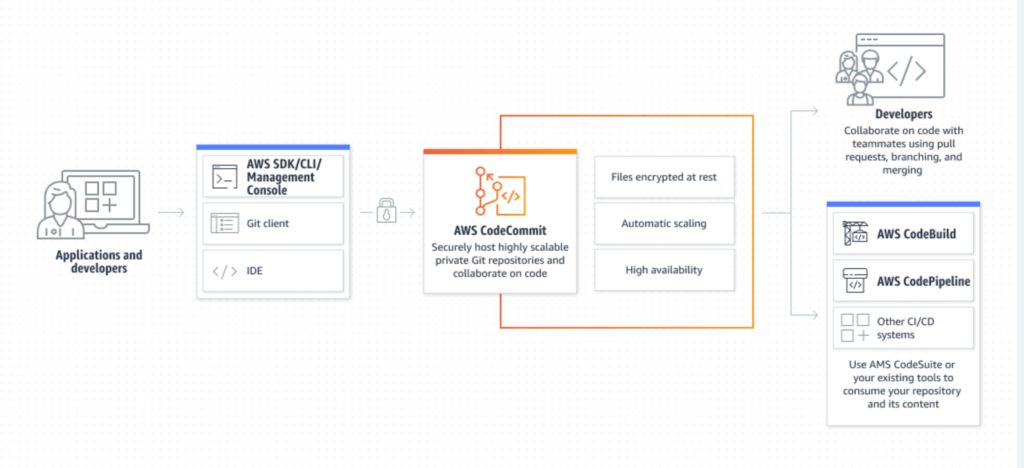
AWS appears to be backtracking on its efforts to provide a complete DevOps service to its customers, with the CodeCommit source code repository service and Cloud9 cloud IDE now closed to new customers.
The company was so quiet about these deprecations, with documentation left in place and no formal announcements, which some only discovered when things did not work as expected. A user who tried to create a CodeCommit repository received an error message: “CreateRepository request is not allowed because there is no existing repository in this AWS account or AWS Organization.” On enquiring further, they received a message from AWS staffer Veera Bomman explaining that “beginning on 06 June 2024, AWS CodeCommit ceased onboarding new customers.”
Bomman also said that “we do not plan to introduce new features to AWS CodeCommit, except for security and availability updates,” and referenced a blog post, posted 5 days ago, on how to migrate an AWS CodeCommit repository to another Git provider, with specific guidance on moving to GitLab or GitHub.
Late yesterday AWS VP and chief evangelist Jeff Barr posted on X that “we made the decision to discontinue new access to a small number of services, including AWS CodeCommit … while we are no longer onboarding new customers to these services, there are no plans to change the features or experience you get today, including keeping them secure and reliable.”
He added that “the services I’m referring to are: S3 Select, CloudSearch, Cloud9, SimpleDB, Forecast, Data Pipeline, and CodeCommit.”
SimpleDB is one of the oldest AWS services and was widely used until the more advanced Relational Database Service was introduced. It is common for older applications that work well not to be changed, making it likely that many applications still use SimpleDB.
A perhaps unforeseen consequence of these stealthy changes is that some AWS templates for Control Tower, a service for orchestrating the setup of an AWS environment, now break. “Anyone that follows the tutorial steps will come across this error as the CloudFormation template tries to create a new CodeCommit repository,” a user complained.
CodeCommit was a key part of the AWS DevOps offering and the FAQ still explains how to set up a new repository, and advertises special features of the service including being fully managed, encrypting files in transit and at rest, integration with AWS IAM (Identity and Access Management), and low latency because repositories are close to build, staging and production environments – presuming these are also on the AWS cloud.
The CodeCommit service did not have huge adoption, with one likely factor being that services such as GitHub and GitLab now offer a huge range of features beyond source code management, with additional security, collaboration and DevOps features being added at a rapid clip.
Customers have complained about the lack of notice and transparency. “Disappointing that this, quite significant, information has not been more widely shared with AWS customers. Is this change part of a wider effort to decommission CodeCommit? Are there any timelines on when this will happen?” asked another user.
Another, on X, said that “the issue is the communication. Which services? Where can we find the details? Why are people finding out in re:post posts instead of comms channels? This particularly impacts partners.”

Regarding AWS Cloud9, another recent post explains how to migrate from Cloud9 to IDE toolkits for products including JetBrains IntelliJ and Microsoft’s Visual Studio Code and Visual Studio. “Developers want the ability to work with AWS resources within their own Integrated Development Environment (IDE) because it allows them to streamline their workflows and leverage familiar tools,” said AWS solutions architect Rodney Bozo, adding, “don’t forget to delete your AWS Cloud9 EC2 instances once you migrate to avoid incurring unnecessary future costs.”
Questions have also been raised about AWS Amplify, a rapid application service. “Is Amplify getting discontinued also? It has a pretty strong dependency on CodeCommit, and no support for self-hosted GitLab,” commented a customer.
Overall the signs are that AWS no longer aims to provide a complete DevOps solution, but now intends to focus on integration with the most popular third-party services. That may be a good thing; but developers would prefer full advance notice and updated documentation rather than slipping out information in low-key forum posts.
